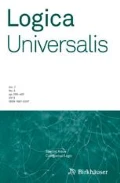Abstract
Our paper aims to investigate inference rules for Nelson’s logics and to discuss possible ways to determine admissibility of inference rules in such logics. We will use the technique offered originally for intuitionistic logic and paraconsistent minimal Johannson’s logic. However, the adaptation is not an easy and evident task since Nelson’s logics do not enjoy replacement of equivalences rule. Therefore we consider and compare standard admissibility and weak admissibility. Our paper founds algorithms for recognizing weak admissibility and admissibility itself – for restricted cases, to show the problems arising in the course of study.
Similar content being viewed by others
References
Almukdad A., Nelson D.: Constructible falsity and inexact predicates. J. Symbo. Log. 49, 231–233 (1984)
Babenyshev S., Rybakov V.: Linear temporal logic LTL: basis for admissible rules. J. Log. Comput. 21(2), 157–177 (2011)
Babenyshev S., Rybakov V.: Unification in linear temporal logic LTL. Ann. Pure Appl. Logic 162(12), 991–1000 (2011)
Cignoli R., Busaniche M.: Constructive logic with strong negation as a substructural logic. J. Log. Comput 20(4), 761–793 (2010)
Iemhoff R.: On the admissible rules of intuitionistic propositional logic. J. Symb. Log. 66(1), 281–294 (2001)
Iemhoff, R.: Towards a proof system for admissibility. CSL-2003 255–270 (2003)
Iemhoff R., Metcalfe G.: Proof theory for admissible rules. Ann. Pure Appl. Logic 159(1–2), 171–186 (2009)
Jerabek E.: Bases of admissible rules of Lukasiewicz logic. J. Log. Comput. 20(6), 1149–1163 (2010)
Jerabek E.: Admissible rules of Lukasiewicz logic. J. Log. Comput. 20(2), 425–447 (2010)
Jerabek E.: Independent bases of admissible rules. Log. J. IGPL 16(3), 249–267 (2008)
Jerabek E.: Complexity of admissible rules. Arch. Math. Log. 46(2), 73–92 (2007)
Jerabek E.: Admissible rules of modal logics. J. Log. Comput. 15(4), 411–431 (2005)
Ghilardi S.: Unification in intuitionistic logic. J. Symb. Log. 64(2), 859–880 (1999)
Gurevich Y.: Intuitionistic logic with strong negation. Stud. Log. 36(1–2), 49–59 (1977)
Friedman, H.: One hundred and two problems in mathematical logic. J. Symb. Log. 40(3), 113–130 (1975)
Johansson, I.: Der Minimalkalkül, ein reduzierter intuitionistischer Formalismus. Compos. Math. 4, 119–136 (1937)
Latkin, E.I.: Generalized Kripke semantics for Nelson’s logic. Algebra Log. 49(5), 426–443 (2010)
López-Escobar, E.G.K.: Refutability and elementary number theory. Indag. Math. 34, 362-374 (1972)
Metcalfe G.: A sequent calculus for constructive logic with strong negation as a substructural logic. Bull. Sect. Log. 38(1–2), 5–11 (2009)
Nelson D.: Constructible falsity. J. Symb. Log. 14(2), 16–26 (1949)
Odintsov, S.P.: Algebraic semantics for paraconsistent Nelson’s logic. J. Log. Comput. 13(4), 453–468 (2003)
Odintsov S.P.: The class of extensions of Nelson’s paraconsistent logic. Stud. Log. 80(2–3), 293–322 (2005)
Odintsov, S., Pearce, D.: Routley semantics for answer sets. In: Proceedings of 8th International Conference on Logic Programming and Nonmonotonic Reasoning, LNCS 3662, pp. 343–355 (2005)
Odintsov, S.P., Rybakov, V.V.: Unification and admissible rules for paraconsistent minimal Johannson’s logic J and positive intuitionistic logic IPC +. Ann. Pure Appl. Log. 164, 771–784 (2013)
Priest, G., Tanaka, K., Weber, Z.: Paraconsistent logic. In: Zalta, E.N. (ed.) The Stanford Encyclopedia of Philosophy (Fall 2013 Edition). (2013)
Rasiowa, H.: N-Lattices and constructive logic with strong negation. Fund. Math. 46, 61–80 (1958)
Rasiowa, H.: An Algebraic Approach to Non-Classical Logic. PWN, Warsaw and North-Holland, Amsterdam (1974)
Rivieccio U.: Implicative twist-structures. Algebra Univ. 71(2), 155–185 (2014)
Routley R.: Semantical analyses of propositional systems of Fitch and Nelson. Stud. Log. 33(3), 283–298 (1974)
Rybakov, V.: A criterion for admissibility of rules in the modal system S4 and the intuitionistic logic. Algebra Log. 23(5), 369–384 (1984)
Rybakov V.V.: Problems of substitution and admissibility in the modal system grz and in intuitionistic propositional calculus. Ann. Pure Appl. Log. 50(1), 71–106 (1990)
Rybakov, V.V.: Rules of inference with parameters for intuitionistic logic. J. Symb. Logic 57(3), 912–923 (1992)
Rybakov, V.V.: Construction of an explicit basis for rules admissible in modal system S4. Math. Log. Q. 47(4), 441–446 (2001)
Rybakov, V.V.: Logics with the universal modality and admissible consecutions. J. Appl. Non-Class. Log. 17(3), 383–396 (2007)
Rybakov V.V.: Linear temporal logic with until and next. Logical consecutions. Ann. Pure Appl. Logic 155(1), 32–45 (2008)
Rybakov, V.V.: Multi-modal and temporal logics with universal formula—reduction of admissibility to validity and unification. J. Log. Comput. 18(4), 509–519 (2008)
Rybakov V.V.: Rules admissible in transitive temporal logic TS4, sufficient condition. Theor. Comput. Sci. 411(50), 4323–4332 (2010)
Spinks, M., Veroff, R.: Constructive logic with strong negation is a substructural logic I. Stud. Log. 88(3), 325–348 (2008)
Spinks, M., Veroff, R.: Constructive logic with strong negation is a substructural logic II. Stud. Log. 89(3), 401–425 (2008)
Thomason R.H.: A semantical study of constructible falsity. Z. Math. Logik Grundl. Math. 15, 247–257 (1969)
Vorob’ev, N.N.: A constructive propositional calculus with strong negation. Doklady Akademii Nauk SSSR 85, 465–468 (1952)
Vorob’ev N.N.: The problem of deducibility in constructive propositional calculus with strong negation. Doklady Akademii Nauk SSSR 85, 689–692 (1952)
Wansing, H.: Negation. In: Goble, L.: (ed.) The Blackwell Guide to Philosophical Logic. Basil Blackwell Publishers, Cambridge, pp. 415–436 (2001)
Author information
Authors and Affiliations
Corresponding author
Additional information
This work was supported by Russian Foundation for Basic Research, Project No. 12-01-00168-a.
Rights and permissions
About this article
Cite this article
Odintsov, S., Rybakov, V. Inference Rules in Nelson’s Logics, Admissibility and Weak Admissibility. Log. Univers. 9, 93–120 (2015). https://doi.org/10.1007/s11787-014-0110-8
Received:
Accepted:
Published:
Issue Date:
DOI: https://doi.org/10.1007/s11787-014-0110-8


